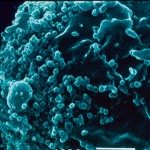Link to Pubmed [PMID] – 9023418
Cell. Immunol. 1997 Feb;175(2):128-40
A low-molecular-weight material present in human placental supernatant (lymphocyte proliferation inhibiting factor, LPIF, or filtrate) can induce tolerance/hyporesponsiveness in vivo. We already knew from previous experiments that this material acted only on preactivated or malignant T cells, and even the malignant cells could be rescued from its action if cells were washed quickly after contact. To understand the mechanisms of its action, we have set up systems of specific stimulation. The material inhibits anti-Vbeta-specific stimulation. In a mixed lymphocyte reaction if responder cell populations from a first MLR performed in the presence of LPIF are harvested, extensively washed to discard suppressor molecules, and restimulated by related or third-party lymphocytes in an H2-incompatible combination, the response to a third-party stimulator (a primary one) is unaffected by prior exposure to the material, which nevertheless renders the population unresponsive to restimulation by the original MHC-stimulating haplotype. Cells triggered by anti-Vbeta6 antibodies in the presence of LPIF are unable to undergo restimulation by the very same anti-Vbeta6 MoAb, while they conserve their capacity to proliferate in a primary fashion in response to the unrelated anti-Vbeta8 MoAb. When analyzed by FACS using anti-Vbeta FITC-conjugated MoAbs, cells that are unresponsive or blocked in their proliferation by the action of the filtrate after anti-Vbeta stimulation are still live and unexpectedly transiently hyperexpress the TcR. These findings confirm the requirement for T cell stimulation for suppression to be enacted and demonstrate that such is exerted by anergy rather than by clonal deletion, at least in vitro.

